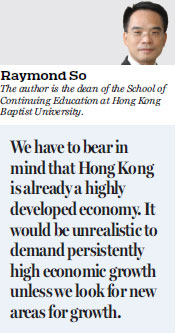Cautious optimism for HK's economy in 2017
Updated: 2017-01-23 06:55
By Raymond So(HK Edition)
|
|||||||||
Last week the International Monetary Fund (IMF) published a report reaffirming Hong Kong's stance on maintaining prudent policies on public finance. In addition, the IMF also praised Hong Kong's financial system, saying it will be able to cope with external shocks. In summary, the IMF is optimistic about Hong Kong's economic growth in 2017.
Contrary to the views of many local people, though Hong Kong is facing a lot of challenges, actually it is not doing badly in the eyes of the international community. The linked exchange rate system, which has been in place since 1983, has been doing well in coping with difficult moments. The most obvious example was the 1997 Asian financial crisis. While Hong Kong suffered badly from that crisis, the linked exchange rate system functioned well and the whole financial system was prevented from a meltdown. When we look around at our Asian neighbors, Hong Kong has an impressive record in managing its financial system. Other economies may have higher economic growth rates than Hong Kong, but the city manages to be the leading financial center in the region. The linked exchange rate system keeps the Hong Kong dollar stable. This is one important contributing factor to Hong Kong's success as an international financial center.

The IMF predicted that Hong Kong would have around 2 percent economic growth. In terms of absolute numbers, economic growth of 2 percent is not impressive. However, we have to bear in mind that Hong Kong is already a highly developed economy. It would be unrealistic to demand persistently high economic growth unless we look for new areas for growth. Given that economic growth on the mainland has slowed down, Hong Kong's mild economic growth somehow is not unexpected. Nevertheless, this figure reminds us: If we cannot find new growth engines, we are bound to experience low economic growth in the years to come.
One major constraint on economic growth in Hong Kong is the high cost of land. Many visionary leaders in the world have concluded that developing creative industries is the right direction for promoting economic growth in future. In order to produce, we need four factors of production: land, labor, capital and entrepreneurship. Given that technological advancement has caused drastic changes to the labor market, we need high-quality human resources more than ever. This means we need upscale professionals and a creative workforce. Hong Kong has good human resources and a talented workforce. Hong Kong is also an international financial center. We do not need to worry about the availability of capital. What we need is land.
Hong Kong's high cost of land is somehow suffocating creativity because it translates into high operating costs. When creativity is being constrained, Hong Kong can hardly shift to a new model of economic development. Hence, we need to increase land supply to support our economic development. This is a daunting task that we must accomplish in order to have better, sustainable economic development for the next generations.
Labor supply is another concern. Although Hong Kong has a large pool of talented people, labor shortages have been observed in virtually all sectors. The government has projected that the local labor force will peak in 2018 before starting to fall. Simple arithmetic tells us that Hong Kong will generate lower economic value if our per capita output remains the same while the number of working people declines. To cope with this challenge, an increase in productivity and expanding the workforce are the two solutions. Nevertheless, politically it is not easy to increase the workforce through immigrants or import of labor. Hence, we need more technological applications in order to improve our productivity. This will be a major challenge.
Apart from economic growth, the outlook for inflation this year will also be mild. Hong Kong has a large chunk of its imports from the mainland. As the renminbi is expected to depreciate further this year, inflation is expected to remain low. Many market commentaries now forecast that Hong Kong will have around 2 percent inflation, which is an acceptable level. Indeed, many economies have set an inflation target of 2 percent - a level that is beneficial to economic growth. The change in price level is likely to remain mild in coming years if no drastic external shocks are encountered.
In summary, Hong Kong's economic outlook in 2017 should be cautiously optimistic. Yet, we need to tackle the problems of labor and land shortages for long-term economic development. Much more work will need to be done in these two areas.
(HK Edition 01/23/2017 page9)